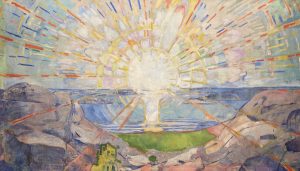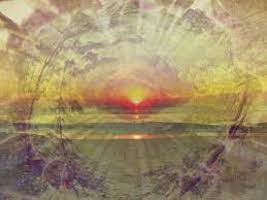 The Yogabliss, Two Rivers/RiverTree Yoga on-line Moving into Meditation classes met this morning. The fires, floods and the beings in their paths have been heavy in my heart this week. I am deeply grateful for the circles of caring friends who are willing to open their hearts and minds in these difficult times.
The Yogabliss, Two Rivers/RiverTree Yoga on-line Moving into Meditation classes met this morning. The fires, floods and the beings in their paths have been heavy in my heart this week. I am deeply grateful for the circles of caring friends who are willing to open their hearts and minds in these difficult times.
Our practice was informed by Rhonda Fabian’s article, Engaged Ecology: Seven Practices to Restore Our Harmony with Nature. Rhonda is Editor of Kosmos, a journal for transformation. She is an ordained student in the Order of Inter-being, an international Buddhist community founded by her teacher, Thich Nhat Hanh. Rhonda’s article synthesizes the work of her teacher, Thay, and several Deep Ecology thought leaders. The article is well worth reading I hope to return to her principles and practices in future classes.
We also heard Powow River Poet, Rhina Espaillat’s poem Guidelines. “The Powow River Poets began in Newburyport in the early 1990s as a company of like-minded poets brought together by founder Rhina P. Espaillat. The group derives its name from a local tributary of the Merrimack River.” Rhina’s Guidelines urge us to love who and what we can while we still have time.
Relaxed Reflection
Welcome. Here we are in circle – this time in the virtual space we are creating together. We enter this moment bringing ourselves fully and wholly . . . Body . . . Heart . . . Mind . . . Feel your breathing . . . Bring your whole awareness to the pulse of breath moving in . . . the pulse of breath moving out. . . .
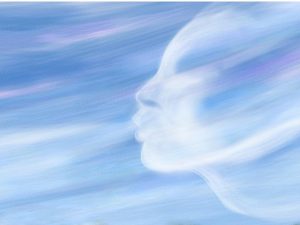 Our breath is Life’s precious gift. Bringing our awareness to our own quiet breathing while sitting without distraction for even a few breaths is one way to come home to our true Nature. We can practice this any time to be refreshed and restored. [Rhonda Fabian]
Our breath is Life’s precious gift. Bringing our awareness to our own quiet breathing while sitting without distraction for even a few breaths is one way to come home to our true Nature. We can practice this any time to be refreshed and restored. [Rhonda Fabian]
Feel the sensations of being alive . . . in your feet . . . legs . . . pelvis . . . low back . . . belly . . . upper back . . . chest . . . arms . . . hands . . . neck . . . head . . . The awareness of your body . . . the body sensations bringing you to this moment . . . this now . . . Our awareness . . . our very being . . . an expression of Nature.
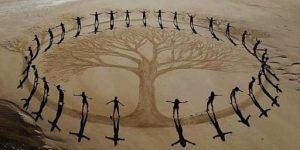 Extend your awareness to each other. . . together we form a circle of human experience in which we share the intention of cultivating awareness and sensitivity – a kinship with life. We . . . are drawn together to grow – like trees whose roots connect underground, branch out and grow toward the light. Here and now . . . we can pause . . . we can feel . . . embodied . . . together . . . growing . . .
Extend your awareness to each other. . . together we form a circle of human experience in which we share the intention of cultivating awareness and sensitivity – a kinship with life. We . . . are drawn together to grow – like trees whose roots connect underground, branch out and grow toward the light. Here and now . . . we can pause . . . we can feel . . . embodied . . . together . . . growing . . .
Reflect on how you are an expression of Nature. We cannot exist without the sun, and rain, the soil and its organisms . . . plants becoming food . . . pollinated by bees, butterflies, moths, flies, beetles, wasps, birds and bats . . . our food, our bodies, nourished by water, air and light . . . Thich Nhat Hanh describes how we are actually made up of non-human elements: a set of condition that allow us to be here. If you really look at a human being or even an orange Thay says you can see the entire cosmos at play.
In describing Deep Ecology, Rhonda Fabian writes:
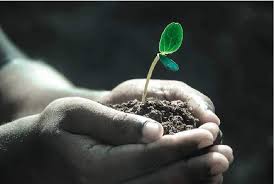 We contain both the seeds of darkness and the seeds of light within us. We have the capacity to generate terrible suffering and the capacity to generate great joy. A new story is already seeded within us, ready to flower. Its truth is found in Nature, in the reality of Interbeing. We are not separate from Nature. Rather, we are a grace note in its vast intelligent symphony. We are not adrift in a cold lifeless Universe. Instead we are a confluence of its vital energies and forces. . . . we are woven into the very fabric of a radiant, vibrant living design.
We contain both the seeds of darkness and the seeds of light within us. We have the capacity to generate terrible suffering and the capacity to generate great joy. A new story is already seeded within us, ready to flower. Its truth is found in Nature, in the reality of Interbeing. We are not separate from Nature. Rather, we are a grace note in its vast intelligent symphony. We are not adrift in a cold lifeless Universe. Instead we are a confluence of its vital energies and forces. . . . we are woven into the very fabric of a radiant, vibrant living design.
We are a confluence and we are also living in a confluence of fire and drought, melting ice and flood, habitat degradation and species extinction. Nature can no longer sustain our way of living. Rhonda writes:
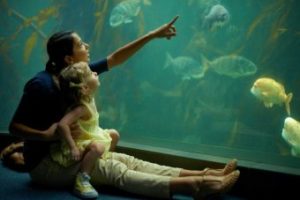 How we live our lives now has everything to do with how we will save ourselves and write a new story for our children and the world. We need . . . a way of being, thinking, and acting, that restores . . . relationship with our communities and . . . Earth. We need shared values. . . . Where can we possibly turn to find values so universal that anyone might embrace them? . . . We can look to Nature.
How we live our lives now has everything to do with how we will save ourselves and write a new story for our children and the world. We need . . . a way of being, thinking, and acting, that restores . . . relationship with our communities and . . . Earth. We need shared values. . . . Where can we possibly turn to find values so universal that anyone might embrace them? . . . We can look to Nature.
Come back to feeling breathing . . . sensation . . . notice how these many words and ideas are landing . . . Observe how you are relating to these concerns . . . Can you meet what arises . . . whatever it may be . . . with compassion . . . compassion for feelings of sadness . . . overwhelm . . . fear . . . numbness or grief . . . Can you acknowledge the courage it takes to attend to these deeply important truths?
Powow River poet Rhina Espaillat offers these “Guidelines”
Here’s what you need to do, since time began:
find something—diamond-rare or carbon-cheap,
it’s all the same—and love it all you can.
It should be something close—a field, a man,
a line of verse, a mouth, a child asleep—
that feels like the world’s heart since time began.
Don’t measure much or lay things out or scan;
don’t save yourself for later, you won’t keep;
spend yourself now on loving all you can.
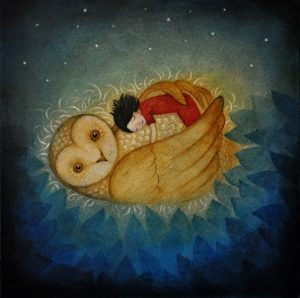 It’s going to hurt. That was the risk you ran
It’s going to hurt. That was the risk you ran
with your first breath; you knew the price was steep,
that loss is what there is, since time began
subtracting from your balance. That’s the plan,
too late to quibble now, you’re in too deep.
Just love what you still have, while you still can.
Don’t count on schemes, it’s far too short a span
from the first sowing till they come to reap.
One way alone to count, since time began:
love something, love it hard, now, while you can. . . .
We can sense Earth inside us. We can imagine those Earth places we hold most dear. Right now we can reflect on our special places and what made them special. We can remember the time we spent enjoying them. We can consider the relationship we hold with them. We can remember who and what we love. And “love it hard while we can.”
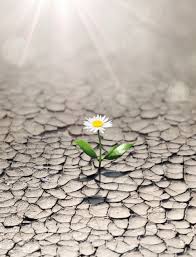 Rhonda set forth Seven Principles and Practices for Engaged Ecology: Principle 1 – Nature’s brilliant design is all-pervasive. Practice cultivating awareness of Nature. Rhonda believes our intelligence is already a reflection of Nature’s intelligence. Consider how you observe and contemplate Nature. Perhaps in forest or parkland, garden or farm, stream or river bank, bay or ocean . . .”Drinking a glass of water with deep awareness” . . . Savoring sweet summer berries . . . In our practice we experience “our breath [as] Life’s precious gift. We can relate to Nature in these ways and be refreshed and restored.
Rhonda set forth Seven Principles and Practices for Engaged Ecology: Principle 1 – Nature’s brilliant design is all-pervasive. Practice cultivating awareness of Nature. Rhonda believes our intelligence is already a reflection of Nature’s intelligence. Consider how you observe and contemplate Nature. Perhaps in forest or parkland, garden or farm, stream or river bank, bay or ocean . . .”Drinking a glass of water with deep awareness” . . . Savoring sweet summer berries . . . In our practice we experience “our breath [as] Life’s precious gift. We can relate to Nature in these ways and be refreshed and restored.
Rhonda writes:
Remembering that Nature has successfully supported life on Earth for billions of years, we begin the work of transforming our fear and healing our consciousness. We find that we can be happy simply because we are alive and supported by the Earth. . . . {She reminds us that] Courage is one of the values we need so that conditions for joy and abundance can return. Our good intentions alone are not enough. . . .
Powow River Poet poet Rhina Espaillat”s Guidelines affirm the courage we need:
. . . Right now you don’t have to parse the entire
universe in infinite, particulate detail;
for just these few minutes merely sit and become
only breath, that is to say, spirit.
Now… what you see is a world without you,
as it was before you were born and
will be when you’re no longer here.
Are you amazed that it goes on without you?
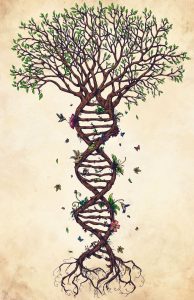 Slowly learn the lesson about who you are:
Slowly learn the lesson about who you are:
dust of the earth, dust of a star.
The stuff that is you has always been here
fulfilling its purpose in losing its Self.
Until you.
Now it’s become human body and brain;
it believes it’s an I and stands apart
from the rest of creation, asserting its right
to be Lord of All, whatever the price.
But you know in these moments the price is too high,
far more than our planet is able to pay.
In your ego-fed effort to have it your way
you have “become Death, the destroyer of worlds.”
The world doesn’t need you the way you need it.
For these next few minutes, let go and just be,
and become not an ego in charge of it all
but a part of the Whole in search of your place.

